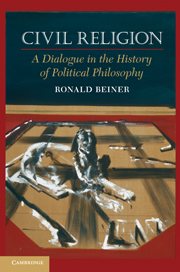Book contents
- Frontmatter
- Contents
- Preface and Acknowledgments
- Introduction
- Part I Machiavelli, Hobbes, Rousseau
- Part II Responses to (and Partial Incorporations of) Civil Religion within the Liberal Tradition
- Part III Theocratic Responses to Liberalism
- 25 Joseph de Maistre
- 26 Maistrean Politics
- 27 Maistre and Rousseau
- 28 Carl Schmitt's “Theocratic” Critique of Hobbes
- Part IV Postmodern “Theism”
- Conclusion
- Index
- References
27 - Maistre and Rousseau
Theocracy versus Civil Religion
Published online by Cambridge University Press: 05 June 2012
- Frontmatter
- Contents
- Preface and Acknowledgments
- Introduction
- Part I Machiavelli, Hobbes, Rousseau
- Part II Responses to (and Partial Incorporations of) Civil Religion within the Liberal Tradition
- Part III Theocratic Responses to Liberalism
- 25 Joseph de Maistre
- 26 Maistrean Politics
- 27 Maistre and Rousseau
- 28 Carl Schmitt's “Theocratic” Critique of Hobbes
- Part IV Postmodern “Theism”
- Conclusion
- Index
- References
Summary
“Gods would be needed to give laws to men.” Not at all, it only takes one.
– Joseph de MaistreSo this is how they reason when they separate man from the Divinity.…[I]t would cost them little to turn their eyes toward the source of being, but such a simple, sure, and consoling way of philosophizing is not to the taste of the writers of this unfortunate century.
– Joseph de MaistreIf Rousseau insists that “a State has never been founded without religion serving as its base,” is there not crucial common ground between Rousseau's account of civil religion and Maistrean theocracy? Indeed, as I cited in Chapter 26, Maistre, in Considerations on France, acknowledged that Rousseau was right that religious ideas “form the unique basis of all durable institutions.” He reaffirmed Rousseau's teaching, in Book II, chapter 7 of the Social Contract, that among the great legislators of history, one ought to privilege theocratic lawgivers such as Moses and Mohammed. (Maistre is obviously less enthusiastic about Calvin!) Rousseau “had only to draw the logical conclusion from this.” The logical conclusion, of course, is that politics is intrinsically theocratic – to which one must add that it was not a simple oversight on Rousseau's part to have failed to draw this conclusion, but rather the consequence of a principled opposition between Rousseauian politics and Maistrean politics.
Maistre's unfinished essay, “On the Sovereignty of the People,” does not directly address Book IV, chapter 8 of the Social Contract. It does, however, offer an extended discussion of Book II, chapter 7, which is the section of the Social Contract most closely linked to the chapter on civil religion. What light does that discussion shed on the Rousseau–Maistre relationship with respect to theocracy and civil religion? First of all, for Maistre it is somewhat misleading to speak of human legislators per se, for the ultimate legislator in any society is always God. God is the source of sovereignty, and because sovereignty issues in laws, the authority to make laws is fundamentally traceable back to God. “[S]ince [God] willed society, he also willed sovereignty and the laws without which there is no society. Therefore laws come from God in the sense that he wills that there be laws and that they be obeyed.” “[S]ociety is not the work of man, but the immediate result of the will of the Creator.” Maistre, of course, does not deny that this divine legislation is necessarily mediated by human legislators. Nonetheless, to focus on the human legislators in abstraction from sovereignty as something willed by God is for him a colossal error that stands in the way of a proper understanding of social order. This is a breach between Maistre and Rousseau that can never be bridged.
- Type
- Chapter
- Information
- Civil ReligionA Dialogue in the History of Political Philosophy, pp. 353 - 358Publisher: Cambridge University PressPrint publication year: 2010

